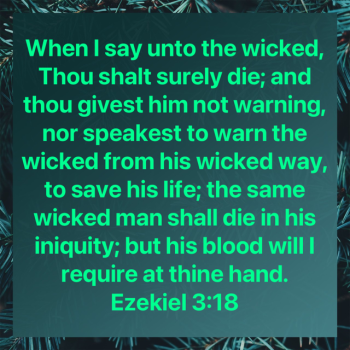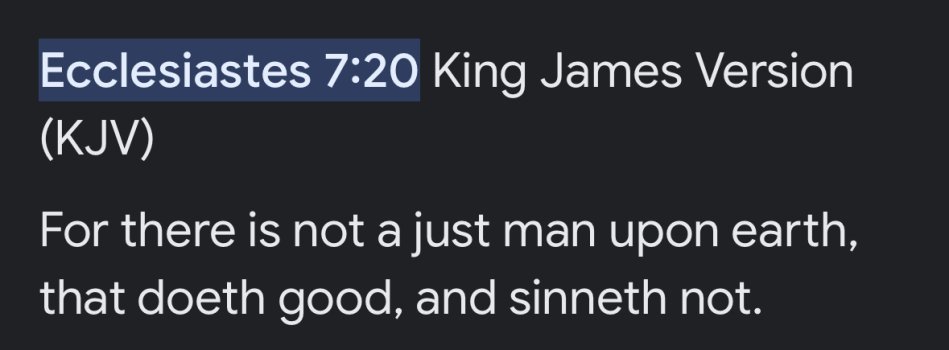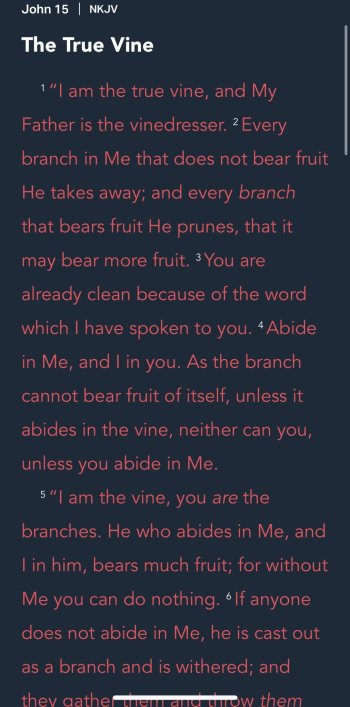Agreed, mirror is all painted over in black so as not to reflect the true image that all others see.The more i read what epi sayeth the more i see a eastern buddism new age mindset of EGO all over it .
They holler against BELIEF in JESUS as though that is RELIGOIUS and yet BELIEVE as they beleive and cannot see its they WHO ARE RELIGIOUS and that we simply preach JESUS CHRIST .
A Spirit of Unbelief
- Thread starter Episkopos
- Start date
-
Welcome to Christian Forums, a Christian Forum that recognizes that all Christians are a work in progress.
You will need to register to be able to join in fellowship with Christians all over the world.
We hope to see you as a part of our community soon and God Bless!
You are using an out of date browser. It may not display this or other websites correctly.
You should upgrade or use an alternative browser.
You should upgrade or use an alternative browser.
amigo de christo
Well-Known Member
For many loveth the words and percepts of men . But lambs , now what do we love and embrace , THE WORDS OF THE LORD .Agreed, mirror is all painted over in black so as not to reflect the true image that all others see.
Now raise those hands sister . ITS LORD praising and thanking time
amigo de christo
Well-Known Member
For new age mysteries have blinded the eyes of many and yet as they wander through the valley
and stumble and fall they cling to the BLIND FOLD covering their eyes and saying OH MIGHTY FOLD upon our eyes
You keep us safe and gaurded and on the path . And though the lambs
preach TRUTH unto them which would remove the blind folds , they resist and say WE SEE , WE SEE
and onwards they do stumble and fumble towards what they think is paradise
and yet its the cliff the leadeth to perdition .
and stumble and fall they cling to the BLIND FOLD covering their eyes and saying OH MIGHTY FOLD upon our eyes
You keep us safe and gaurded and on the path . And though the lambs
preach TRUTH unto them which would remove the blind folds , they resist and say WE SEE , WE SEE
and onwards they do stumble and fumble towards what they think is paradise
and yet its the cliff the leadeth to perdition .
amigo de christo
Well-Known Member
Their mirror is but a canvas they themselves have painted of themselves . They use the best colorsAgreed, mirror is all painted over in black so as not to reflect the true image that all others see.
and paint with a brush full of diverse and many colors and look deeply at their painted canvas
at what they think themselves to know and to be . BUT BELIEVE ME ITS JUST A PAINTING of their own minds creation
and cannot expose them as they are but rather leadeth them to what they think they are and can become . GREAT IN THEIR OWN EYES
a creation which sayeth We have no need of THE CHRIST , for the divine is within us all and we can do it ourselves .
amigo de christo
Well-Known Member
For many loveth the words and percepts of men . But lambs , now what do we love and embrace , THE WORDS OF THE LORD .
Now raise those hands sister . ITS LORD praising and thanking time
amigo de christo
Well-Known Member
I SEEN satan as lightning fall ...............................JESUS Once said this to his own desciples . PRIDE . what a destroyer of one it truly is .
And i gotta say ITS BIG TIME PRIDE to KICK THE DIRE NEED TO BELIEVE ON JESUS THE CHRIST out of the way
and THINK YOU BIG ENOUGH TO DO IT YOURSELF . just a friendly reminder about why we ought not to preach
a CHRISTLESS CROSS , the idea we have no need to BELIEVE ON CHRIST , WHEN EVEN GOD GAVE TESTIMONY WE OUGHT TO BELEIVE ON CHRIST . Some folks think they are greater than GOD . NOT A GOOD SIGN at all .
And i gotta say ITS BIG TIME PRIDE to KICK THE DIRE NEED TO BELIEVE ON JESUS THE CHRIST out of the way
and THINK YOU BIG ENOUGH TO DO IT YOURSELF . just a friendly reminder about why we ought not to preach
a CHRISTLESS CROSS , the idea we have no need to BELIEVE ON CHRIST , WHEN EVEN GOD GAVE TESTIMONY WE OUGHT TO BELEIVE ON CHRIST . Some folks think they are greater than GOD . NOT A GOOD SIGN at all .
amigo de christo
Well-Known Member
Yeah, I saw it too and snagged it to my OWN gallery !View attachment 36127
I know its off topic , but someone sent this on another site and i thought why not .
amigo de christo
Well-Known Member

Now paul quoated from this . WHEN TELLING the CHURCH he had not shunned to declare all the counsel of GOD .
AKA paul preached BELIEVE YE IN JESUS CHRIST . I FEAR for and shudder in total fear for those
who rather REFUSE to point to CHRIST and rather try and tell folks OH no need to believe on him .
GUESS WHOSE BLOOD gonna be on the hands of those who did this . my advice , CEASE THE LIE
and PREACH JESUS CHRIST or prepare to wail on the DAY OF THE LORD .
amigo de christo
Well-Known Member
ScottA
Well-Known Member
Here is the last quick-vid taken from the latest podcast...podcast #18. I post these for your consideration. Rather than comparing my posts with what you already believe or have been taught, I ask you to compare what I say with the Bible. This video is very short, certain to not take up much of your time. There is a link provided to the full podcast in the video. :)
It does indeed sound like you are advocating for a perfectly lived life.
History is surely repeating itself. Yet it would be better to confess as Paul did, that although it was in his heart to do what is perfect, that he "did not do." Meaning, that no, we do not attain perfection in our flesh by belief, but are rather accredited perfection or righteousness by our belief and forgiven of our sins. Which is to say, the body of flesh was born under sin and still suffers and dies under sin, and it is "not that body" but our new body born [again] of the spirit of God which has attained righteousness.
amigo de christo
Well-Known Member
He does worse than that . Teaching ideas that one dont even have to BELIEVE ON JESUS CHRIST .It does indeed sound like you are advocating for a perfectly lived life.
History is surely repeating itself. Yet it would be better to confess as Paul did, that although it was in his heart to do what is perfect, that he "did not do." Meaning, that no, we do not attain perfection in our flesh by belief, but are rather accredited perfection or righteousness by our belief and forgiven of our sins. Which is to say, the body of flesh was born under sin and still suffers and dies under sin, and it is "not that body" but our new body born [again] of the spirit of God which has attained righteousness.
now that is anti gospel , anti christ . JOHN would not have tolerated it .
JOHN who wrote more about love in his letter
had this to day about those who denied JESUS the CHRIST .
They are a liar , are anti christ . The lie is being sold to the many now as they embrace rather
under the idea that the love of God is within all the relgioins and all are fine so long as they love .
BUT IT AINT THE LOVE OR TRUTH OF GOD they be sitting under . ITS A LIE and it do cometh of anti christ .
As for me . GUESS WHO I AM POINTING TOO . JESUS CHRIST and reminding any and all , YET MUST BELEIVE .
What happened to..."I can do all things through Christ who strengthen me?"It does indeed sound like you are advocating for a perfectly lived life.
History is surely repeating itself. Yet it would be better to confess as Paul did, that although it was in his heart to do what is perfect, that he "did not do." Meaning, that no, we do not attain perfection in our flesh by belief, but are rather accredited perfection or righteousness by our belief and forgiven of our sins. Which is to say, the body of flesh was born under sin and still suffers and dies under sin, and it is "not that body" but our new body born [again] of the spirit of God which has attained righteousness.
Caleb and Joshua were different than the other Israelites they sojourned 40 years in the wilderness with. What was that difference?
They had faith. They knew that God was greater than any shortcomings they had. When these 2 men returned from "spying" the the Promised Land, they were full of faith in God. Not so the other 10 spies...nor the people they witnessed to. So they entered NOT into the Promised Land due to unbelief. They heard the gospel, but rejected its implications...same as today.
Were the Israelites more unbelieving than most people? How about us? Or does this show us how very few will see what seems impossible for us to do in our own strength is as nothing to God.
Pentecost birthed the church in power. Do we need a new Pentecost...or just a little faith?
The test of our faith is not to have a belief that states we are accredited perfection even as we fail as any human fails. Beliefs don't give us the power over sin. But grace does. Faith brings grace....to the humble.
The test of our faith is whether we trust in God to empower us to overcome as Jesus overcame.
1 Pet. 1:5 Who are kept by the power of God through faith unto salvation ready to be revealed in the last time.
Rev. 3:21 To him that overcomes will I grant to sit with me in my throne, even as I also overcame, and am set down with my Father in his throne.
Rev. 21:7 He that overcomes shall inherit all things; and I will be his God, and he shall be my son.
The test of our faith is whether we trust in God to empower us to overcome as Jesus overcame.
1 Pet. 1:5 Who are kept by the power of God through faith unto salvation ready to be revealed in the last time.
Rev. 3:21 To him that overcomes will I grant to sit with me in my throne, even as I also overcame, and am set down with my Father in his throne.
Rev. 21:7 He that overcomes shall inherit all things; and I will be his God, and he shall be my son.
Taken
Well-Known Member
BELIEF, is that WHAT a man chooses.Beliefs or faith? If we had religious beliefs the size of a mustard seed we could move mountains???
Beliefs are in the realm of religion. They come from the temporal part of us...what we think or believe or have an opinion about. Of course beliefs are inevitable....that we take on certain dogmatic stances we think are correct.
UNLESS...we learn to not put ANY confidence in the flesh. Our beliefs will always clash with the beliefs of others. If we raise up beliefs as anything but the flesh at work...we end up with thousands of denominations.
Yet there is only one Body.
Faith, on the other hand is towards God. God loves faith and rewards that faith with His grace. Miracles happen by faith. The chiefest gift of grace IMHO is to be translated into the higher walk...translated into the kingdom realm...to walk as Jesus walked. (Seek first the kingdom)
The mountain that is moved in that case is the outer man and any and all human understanding. The Bible often relates mountains and hills to our pride. The valleys we can relate to the disheartened, the downcast. So we are to take heart..and be lifted up from the valleys. We are to humble ourselves...bringing down the pride of our lofty claims and ideas...making the way straight before the Lord. :)
FAITH, is a GIFT that WHAT Gods gives a man who chooses Him.
ScottA
Well-Known Member
What happened to..."I can do all things through Christ who strengthen me?"
Caleb and Joshua were different than the other Israelites they sojourned 40 years in the wilderness with. What was that difference?
They had faith. They knew that God was greater than any shortcomings they had. When these 2 men returned from "spying" the the Promised Land, they were full of faith in God. Not so the other 10 spies...nor the people they witnessed to. So they entered NOT into the Promised Land due to unbelief. They heard the gospel, but rejected its implications...same as today.
Were the Israelites more unbelieving than most people? How about us? Or does this show us how very few will see what seems impossible for us to do in our own strength is as nothing to God.
Pentecost birthed the church in power. Do we need a new Pentecost...or just a little faith?
The one does not void the other.
Regarding "I can do all things through Christ who strengthens me", did Christ not endure sin until death? He did, but you stating this verse would seem to assert that He was baptized and then never again came under sin afterwards, and that that is the model which we are to follow. But that is not true-- On the contrary, He did come under sin afterwards, ours. And it is rather His enduring sin unto death afterwards that we are to expect to follow. Meaning the Holy Spirit comes upon us and then we continue to endure sin unto death, even after we were set free from it having been born again of the spirit of God. That is the correct precedence that He has set before us.
This is then elaborated by Paul who found to be true and declared that both the law of sin and death, his old man and his new man, continued to war against one another. I submit therefore, that this is what he meant when he said, "we who are alive and remain"...meaning we who are alive in the spirit and in God, but remain in the flesh and in the world having yet passed from the flesh.
But since you brought up Joshua and Caleb-- that was a foreshadowing account representing Jesus and the "dog" (Caleb), meaning the salvation of the Jews and also the Gentiles, the dead and the living in Christ.
Last edited:
We can have faith in God in spite of our beliefs. That's the test of faith. Our beliefs get in the way of faithBELIEF, is that WHAT a man chooses.
FAITH, is a GIFT that WHAT Gods gives a man who chooses Him.
As in..I believe Lord, help thou my unbelief. We can stop limiting God.
There is a gift of faith from God, yes...to do things on a miraculous level. But we are to walk by faith in what He has commanded us with whatever faith we have.
Faith and belief are not synonymous. Faith trusts that God can do what He has said He would do.
We can do all things through Christ who strengthens us. Or we can allow unbelief to limit God.
Last edited:
All have sinned. Even the righteous sin. But righteousness is not about perfection...it's about honesty and contrition.
Holiness is about having no spot or wrinkle of sin...not righteousness.
Similar threads
- Replies
- 39
- Views
- 877
- Replies
- 7
- Views
- 301
- Replies
- 30
- Views
- 1K
- Replies
- 0
- Views
- 406
- Replies
- 0
- Views
- 89





